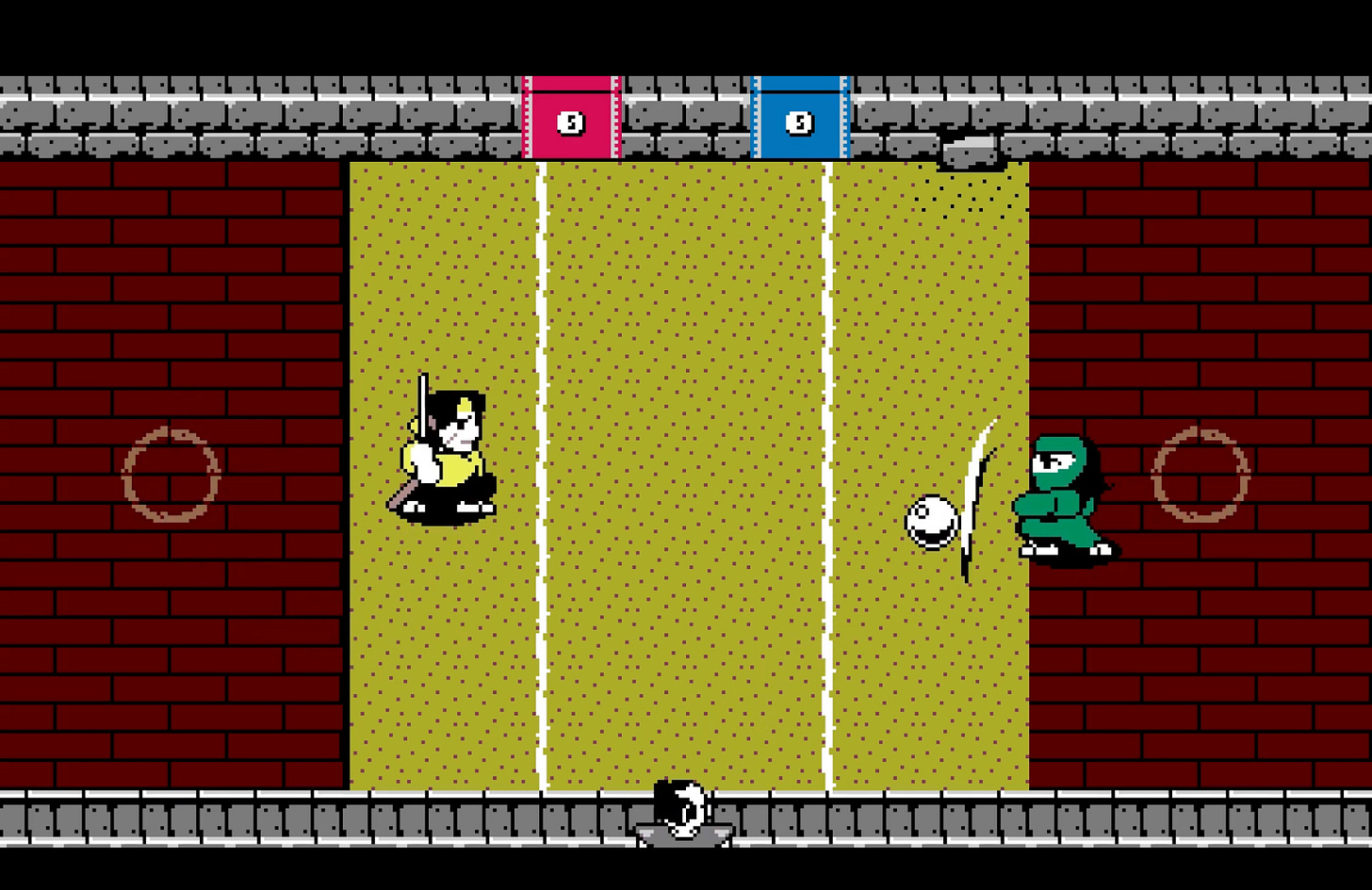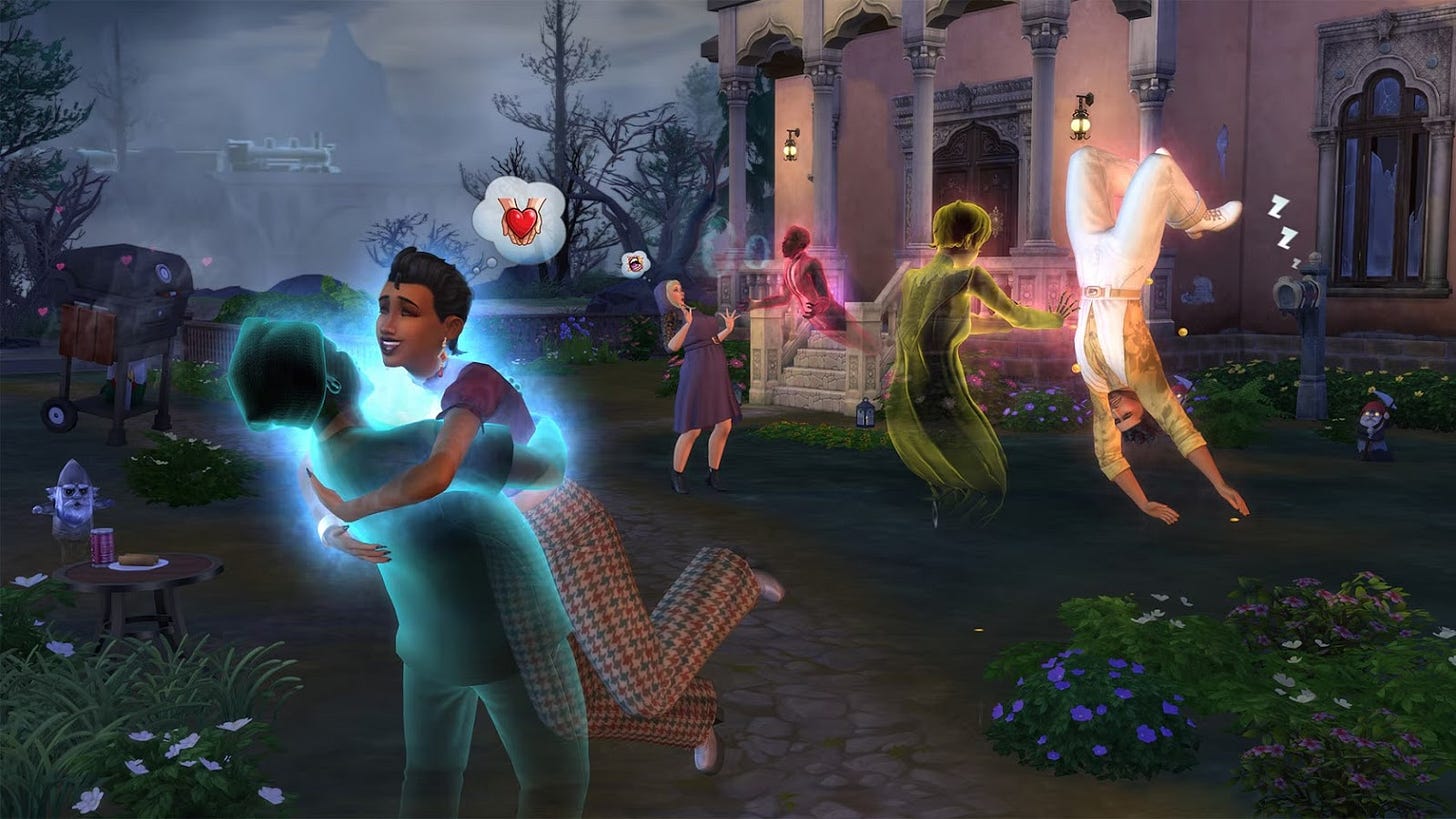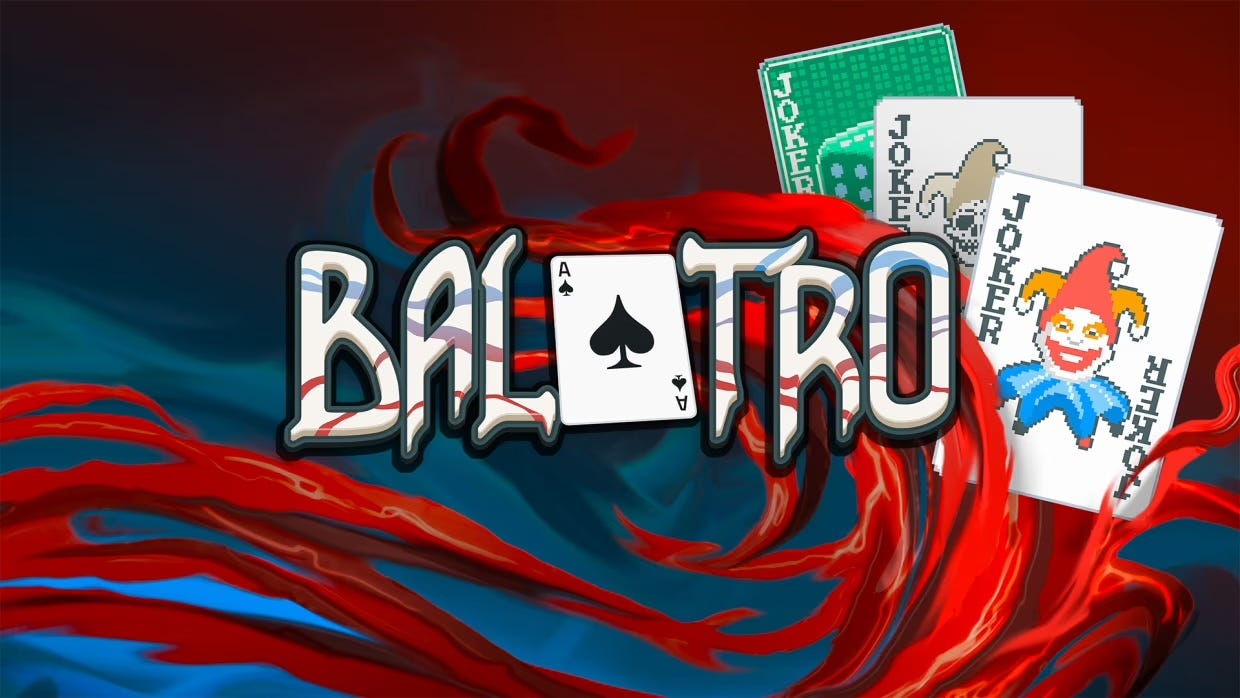The best retro computer that never was
Plus ghost Sims, mobile Balatro, and old pinball games.
Hello there! It must be the start of spooky season, because my inbox is full of codes for Halloween appropriate games, Target is full of Christmas trees, and The Sims is finally getting that ghost mode that was previously the thing of unofficial mods only. Also this week we’re looking at UFO 50, the mobile version of Balatro, what’s new on the subs and more. Let’s go!
Finally, a collection with Bushido Ball!
By Tim
Few people remember the LX home computer, on which prolific publisher UFO Soft released its games between 1982 and 1989. Because neither it nor the company ever actually existed. The games, however, are very real.
Derek Yu, creator of Spelunky, announced UFO 50 in 2017 and I’ve been waiting for it ever since. This is a collection of 50 games, packaged together as though for a digital historical retrospective about the fictional company and console, but actually developed by Yu and his collaborators over the past few years.
And these are not merely gags, minigames or quick throwaway experiences, but 50 full games. Searching and playing through them feels very much like running down a list of ROMs on an emulator for an unfamiliar old console; some games are completely indecipherable at first, some are multiplayer-focused, some have ridiculous cutscenes and dialogue, and some are instant classics.
The “earliest” games are clunky and primitive, and there’s a curve of complexity as the years go by, but they all adhere to a similar set of technical limitations that makes them feel tied to a specific machine.
Some of the games feel straight out of the 80s, like the grid-based exploration titles, the first-person dungeon crawlers, the RPGs and the maze puzzles. But then there are also anachronistic delights, as though UFO Soft was decades ahead of its time.
Among those games there’s a gravity-flipping Metroid-like where your collected upgrades can be applied to your gun, suit or grav tech for a range of different effects. There’s one where you’re an alien delivering onions and it plays like Crazy Taxi meets the original GTA. And a turn-based strategy campaign where you fight by flicking discs representing your units at the enemy.
There’s a platformer where you kill yourself in certain ways so your next life can use the remains to progress. A sim where you have to manage a house party. A procedurally generated run-and-gun. An 8-bit Smash-like. A mini golf pinball mashup. I could go on and on, but the point is these are huge games, half of them with multiplayer options, and more than half of which rule.
Along the way there are touches of a meta narrative about UFO Soft, told in the brief descriptions of the games and the way certain elements cross over between titles. But I suspect there’s a lot more beneath the surface. Playing with the interface will weirdly give you access to a little garden game featuring the publisher’s mascot (?), while the pause menu can bring up a terminal that seems to be filled with hex code for you to do … something with?
It’s intriguing, but the meat of the experience is absolutely the games. I simply can’t believe this colossal effort panned out as well as it did.
What to play
New to Game Pass is We Love Katamari Reroll, the remaster of the kooky 2005 roll-em-up sequel, as well as king-fu brawler SIFU and edgelord simulator Payday 2.
Nintendo has released the two GBA F-Zero games onto its Switch Online + Expansion Pack service. Between this and the ongoing F-Zero 99, does that mean a new entry in the series is on its way? Nah.
New to Apple Arcade this week is NBA 2K25 Arcade Edition! It’s like regular NBA 2K25, only without any microtransactions or the city. Meaning it’s actually good. It’s so good.
Where to The Sims go when they die?
By Alice
It has been a really great year for fans of The Sims 4, with some pretty great expansions and stuff packs announced and released. My personal highlight was The Sims 4 Lovestruck, which gives Sims new options for romance, as well as turn ons and offs for their character traits. It was a definite step up from previous iterations of romance-themed packs Hot Date and Nightlife from The Sims 1 and 2, respectively.
The Sims 4 is absolutely nearing the end of life, with The Sims 5 undoubtedly around the corner after ten years of the game. But, before the grim reaper comes to help it shuffle off to the great PC in the sky, EA just announced a brand new expansion pack: The Sims 4 Life & Death.
Given that love and death are really the two main features of The Sims, this new release sounds like a no-brainer, and I’m frankly surprised it took so long.
This expansion will answer the questions “where do Sims go when they die?”, “do Sims have an afterlife” and “what are Sims burial rituals like?” Sadly, it does not address the question of who the true gods of the sims world are, given we create all the people, but have no control over the afterlife. Does this mean we’re in a Greek situation with different gods in charge of different things? Are we Zeus in the Sims world?
Theology aside, the new expansion will allow players to visit a new town, Ravenwood, where the veil between worlds is thinner, allowing you to interact with ghosts who have unfinished business.
It sounds like a fun spooky twist, coming out the day after Halloween. It’ll be interesting to see how it combines with the vampire and werewolf stuff packs.
Bricks, Boards and Beginnings
by Alice
Balatro is a card game that answers the question “what if poker had booster packs, for some reason”. It’s a game that players have been known to indulge in in a compulsive way, with many playing during work.
Last week it launched on Apple Arcade, so I decided to give it a go, and I too got sucked into playing it entirely too much. It’s a really interesting game that relies on strategy and luck in fairly equal measures. I have played an embarrassing quantity to the point that I’ve had to set limits on it in the Screen Time settings of my phone.
But, here’s the thing: I can’t tell if I actually like it. Is it fun? Or does it scratch the itch on a certain part of my brain? Does it matter?
I find the act of playing it to be delightfully mindless. It’s the opposite of mindfulness in a way that could possibly be spun as healthy. If it was a game with micro transactions I would probably think it harmful, a form of digital crack.
Not all games need to be fun, of course, but they do need to be something: an outlet, a way to socialise with friends from afar, poignant, interesting, stimulating, etc. I’m not actually sure Balatro is any of those things. The main thing it is is addictive, which sure is something. I’m glad the creator has made sure it can’t be licensed for real gambling after his death, because I could easily see people losing their shirts over this game. It’s devilishly difficult to beat with each deck.
For now, I enjoy playing it enough and the limits I have in place will stop it from being too weird, so I plan on continuing to play it until it stops being enjoyable.
But I don’t know whether I’d recommend it, or whether I’m glad it exists in the way that I would the other games I frequently play. It exists in an interesting grey area.
Either way, it’s on Apple Arcade now.
Retro Esoterica
by Tim
You know what’s more retro than video games? Pinball. So pinball video games must be the most powerfully retro thing of all, right? Although they necessarily came after actual pinball. Ah who cares I just want an excuse to talk about pinball games.
There are a lot of 70s and 80s games devoted to simulating pinball, across platforms like the Atari 2600, NES and even Mac and Windows. But the most interesting games started appearing once pinball gameplay was combined with controls and effects you could never get on a physical board.
In 1988, Compile’s Alien Crush (pictured) provided a Giger-inspired playfield with atmospheric music and a heap of monster-smashing hidden screens, while its 1990 sequel Devil’s Crush moved to a satanic theme and smooth vertical scrolling. Both are PC Engine must-plays.
Meanwhile HAL, who had created the NES Pinball and the competition-focused Rollerball, also got a bit abstract with their 1990 entry for the Game Boy: Revenge of the ‘Gator. In 1993 they took the idea even further, including their trademark character in the role of the ball in Kirby’s Pinball Land. These games stick very true to the design of pinball tables, yet incorporate impossible gimmicks like living enemy characters, which would become a blueprint for many others to follow.
There’s Sonic Spinball of course, and Super Mario Ball, Metroid Prime Pinball, Pokemon Pinball, Pac-man Pinball Advance, and even Nintendo’s profoundly strange feudal Japan GameCube pinball game Odama.
These days there are heaps of pinball-simulating games, but thankfully the tradition of weirder more video-gamey fare continues as well. Check out Demon’s Tilt for an occult table with heaps of effects, or Yoku’s Island Express for a platform metroidvania with sweet pinball mechanics.







